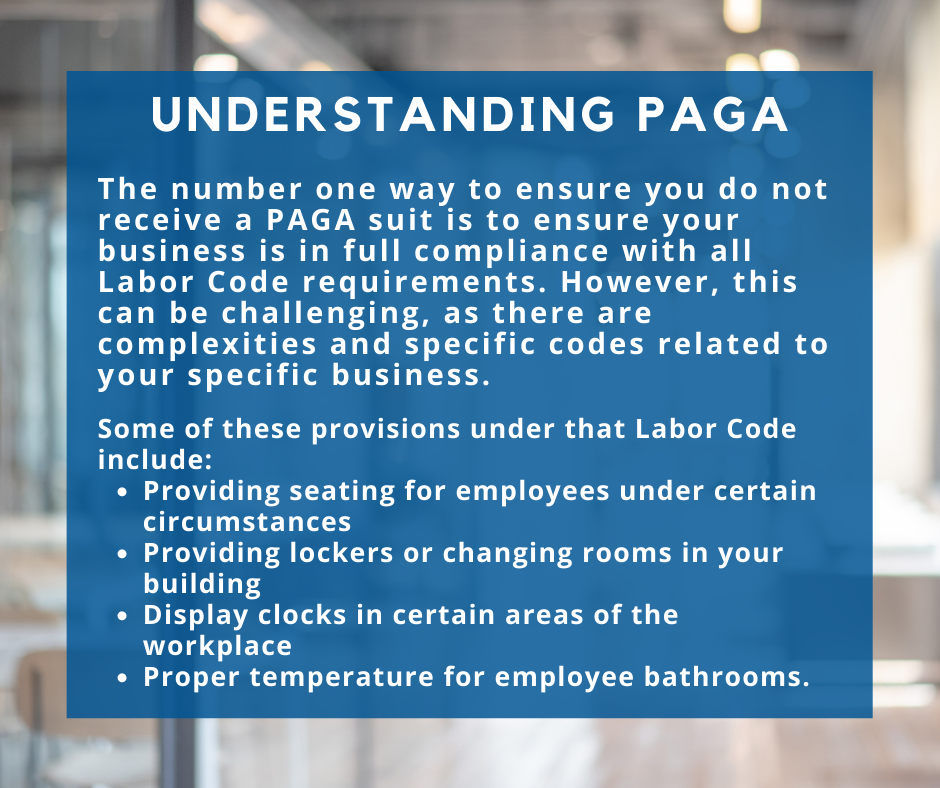A new lawsuit is on the rise in California! One of the biggest issues facing business owners today is PAGA lawsuits. PAGA is the Labor Code Private Attorneys General Act. Business owners should consider enacting an arbitration agreement to counter these lawsuits.
Here’s some more information about what you need to know about PAGA in relation to your business.
What is PAGA?
PAGA authorizes aggrieved employees to file lawsuits that recover civil penalties on behalf of themselves, other employees, and the State of California for Labor Code violations. This law gives California employees the right to start a lawsuit against their employers for any violation of the California Labor Code. This law gives employees an opportunity to act as the enforcement agency. This is done through recovering civil penalties on behalf of the California Labor Workforce Development Agency for aggrieved employees and their co-workers.
Originally PAGA was designed to regulate the underground economy, including businesses that unlawfully operate outside of tax and licensing requirements. It also allows employees to sue for nearly every Labor Code violation.
PAGA claims can be more harmful to an employer than a typical Labor Code violation or Unfair Business Practices claim.
The two components of PAGA that affect employers
PAGA gives employees the ability to sue as Private Attorneys General to receive monetary penalties for an employer’s violation of the Labor Code. Prior to PAGA, employees were unable to bring civil actions in court to enforce non-monetary provisions in the Labor Code.
Secondly, employers may be subject to monetary penalties for each violation of the provisions in the California Labor Code. If the penalty does not exist when the claim is brought about, PAGA imposes a $100 fine for the first violation and a $200 fine for each violation following. If the Labor Code already has a civil penalty for the violation in question, the employee can sue to recover the penalty on behalf of similarly aggrieved employees.
PAGA claims originally were used to target large employers with working conditions where violations were continuously occurring. However, when retail chains, like the 99 cent store, were hit with a PAGA lawsuit involving the failure to provide cashier’s chairs to sit in while they waited for customers to ring up, other suits followed. Once the California Court of Appeal upheld a trial award under PAGA to the plaintiffs for the violation, it further enforced that PAGA could be used to profit and bring suits for non-monetary employment violations.
How can employers combat these claims?
The most efficient way to ensure that you do not receive a PAGA suit is to ensure your business is in full compliance with all Labor Code requirements. However, this can be challenging, as there are complexities and specific codes related to your specific business.
Connect With Us Today
Some of these provisions under that Labor Code include:
- Provide seating for employees under certain circumstances
- Provide lockers or changing rooms in your building
- Display clocks in certain areas of the workplace
- Proper temperature for employee bathrooms
While this is an incomplete list of the provisions under that Labor Code, it illustrates just how difficult compliance can be. Employers should be proactive in attempting to identify potential bases for claims against them of non-monetary Labor Code violations. Once identified, ensure those issues are remedied as quickly as possible. Consider enacting an arbitration agreement to help counter these lawsuits before they arise.
Unsure where to begin? Contact Roger today, see how he can help get your business ready for whatever comes your way.

Conclusion
The Private Attorneys General Act (PAGA) in California allows employees to sue employers for labor code violations on behalf of themselves and other employees. This act significantly impacts businesses, exposing them to costly lawsuits and penalties. Employers should ensure compliance with labor laws to mitigate risks associated with PAGA claims. Regular audits, clear policies, and employee training are essential strategies for managing compliance and reducing potential liabilities. Readers are invited to connect with Roger J. Stewart to mitigate risk with employee liability insurance.


